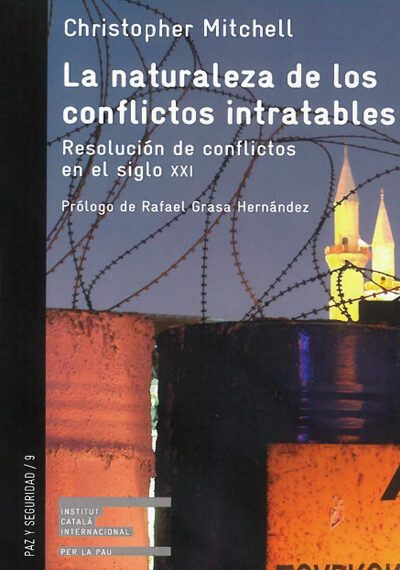
Christopher Mitchell. La naturaleza de los conflictos intratables. Resolución de conflictos en el s. XXI. Barcelona: Institut Català Internacional per la Pau, 2016.
La naturaleza de los conflictos intratables (The Nature of Intractable Conflicts: Resolution in the 21st C) is destined to be a reference work in the theory and practice of conflict resolution and transformation. This work culminates a life of prolific and fertile research and proves the maturity, relevance and fecundity of the field of conflict analysis, resolution and transformation, both in the present and in the future.
Mitchell’s book resumes, four decades after his seminal work The Structure of International Conflict, the most relevant topics of the theory and practice of conflict resolution which he himself contributed to develop. According to the author himself, there are fewer possibilities that communities and its leaders establish positive relations in the future if they remain trapped in prolonged and intractable conflicts in the present. Both conflict transformation and the consolidation of peace depend, undoubtedly, of the previous and effective resolution of these conflicts.
Parting from the certainty that conflict is inevitable and that violence is not, nor should be, always the only possible ending for difficult-to-solve conflicts, Mitchell proves that it is possible to deal with intractable conflicts.
The author
Christopher Mitchell has degrees in Economics and International Relations from London University but is actually a historian. He has held academic jobs at London University, the University of Southampton and City University, London as well as teaching at the University of Southern California, Brigham Young University and the University of Maryland. In the 1960’s he was part of the pioneering research team at University College, London which, under the leadership of Dr John Burton, developed the basic ideas of conflict resolution, problem solving workshops and informal “Track Two” interventions into protracted conflicts. Since then, he has been involved in T2 interventions that have tried to address the sources of, and solutions for conflicts between Greek and Turkish Cypriots, Israelis and Palestinans, Somalis and Ethiopians, British and Argentinians, Nationalists and Unionists in Northern Ireland, Basques and Spaniards, Moldovans and Trans-Dniestrians, as well as diverse Liberian factions.
